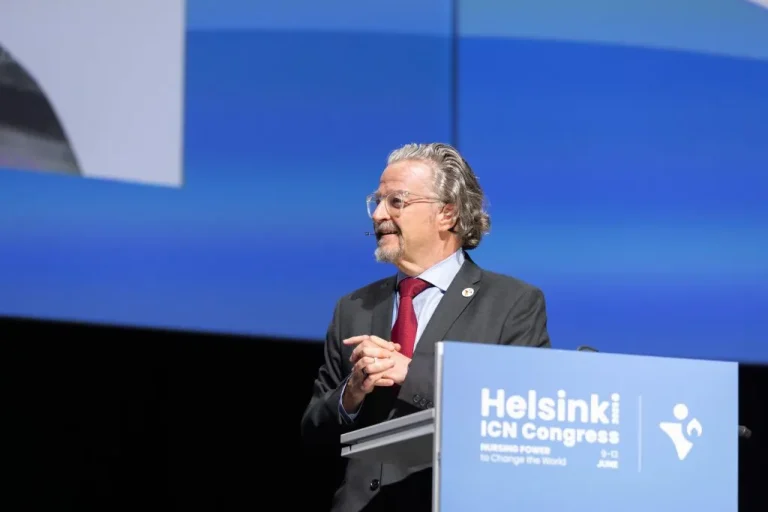International healthcare recruitment practices by wealthy countries are a “rip-off”, according to a global body representing nurses, which cited figures suggesting billions are being saved through overseas staff.
The International Council of Nurses (ICN) criticised the UK, Canada and other countries for failing to sufficiently compensate the countries from which they had recruited many nurses in recent years.
The ICN’s chief executive, Howard Catton, has today repeated his call for the creation of an international fund to help support the development of countries exporting large numbers of nursing staff.
“It feels like a rip-off… ‘we’ll give you a thousand or two for your nurses, but we’re saving billions’”
Howard Catton
Mr Catton had outlined how he wanted governments of wealthier countries to contribute more while speaking on the final day of the 2025 ICN Congress in Helsinki last month.
In a new statement reinforcing his message, he also accused wealthier countries of engaging in a “sleight of hand”, by offsetting massive amounts hiring abroad rather than paying to educate their own nurses.
He cited new data from the Canadian Academy of Health Science and Royal Society of Canada suggesting Canada saves around CA$1bn (£533m) each year through recruiting healthcare workers, including doctors and nurses, from overseas by not paying for their training.
Canada has some of the highest rates of international recruitment in the world. Mr Catton asserted that if Canada had saved that much money, it could mean that the top 10 countries for international recruitment, together, could be saving the equivalent of at least $10bn.
Meanwhile, nursing representatives in some African countries have reported to the ICN that their government was only receiving as little as $1,000 per nurse from the country recruiting them.
Speaking in Helsinki, Mr Catton said there was “very thin evidence of financial compensation” for the countries training and exporting nurses, many of which had their own workforce shortages.
“It’s a huge saving in terms of offsetting the costs of education that countries appear to be making by recruiting overseas,” he said.
“I think it feels like a rip-off… ‘we’ll give you a thousand or two for your nurses, but we’re saving billions’,” he said.
Furthermore, he said this funding sometimes does not then get invested into nursing due to competing priorities of nations facing huge amounts of costs, debt and challenges.
Mr Catton specifically called for the creation of a pot of money, which he suggested could be used to compensate countries exporting healthcare workers they cannot afford to lose.
The fund, he said, would be created through contributions by receiver countries equivalent to a certain proportion of the money they saved on training costs.
He did not suggest a specific amount, but said it should be a substantial percentage.
In addition, Mr Catton said the World Health Organization (WHO)’s Global Code of Practice on the International Recruitment of Health Personnel must be strengthened.
This agreement includes a prohibition on active recruitment from some countries facing acute workforce shortages, known as the ‘red list’. Mr Catton echoed former ICN president Dr Pamela Cipriano’s calls for the code to have more “teeth”.
As part of this, he suggested that governments could agree to write off a certain amount of national debt owed by a country from which they are recruiting nurses, in order to help develop healthcare services there.
Asked by Nursing Times how his organisation would persuade world governments to go along with these plans, Mr Catton acknowledged it would be a challenge – but said he knew that politicians in many wealthy countries understood and sympathised with the issue.
“I see a number of countries, the UK [for example], who I believe genuinely recognise the tensions here,” said Mr Catton.
Earlier this week, Royal College of Nursing (RCN) chief executive and general secretary Professor Nicola Ranger said she was “ashamed” by the UK’s international recruitment conduct.
Mr Catton said he understood that this sentiment was shared by some politicians in wealthy countries, even if they would not use Professor Ranger’s exact words.
He said: “I want to enable nursing leaders to go into the conversations… I’m not saying that these countries are unethical, that they have unethical intentions – I think that many of them absolutely have the [understanding] to that.
“But can we help them? Can we help them by just exposing the numbers on this, as well?”
In the statement issued today, Dr José Luis Cobos Serrano, the current ICN president, said: “Any country that wants to be seen as ethical must provide mutuality and real, proportional giveback when they take health workers from overseas.
“If rich countries are saving billions, why can’t they put a proportion of those gains back into a global fund to strengthen nurse education in source countries?”
He added: “We know developing nations spend more on servicing their debts than on their entire healthcare or education budgets — why aren’t wealthy countries writing off part of the sovereign debt owed to them by the nations whose workforces they are depleting?”

